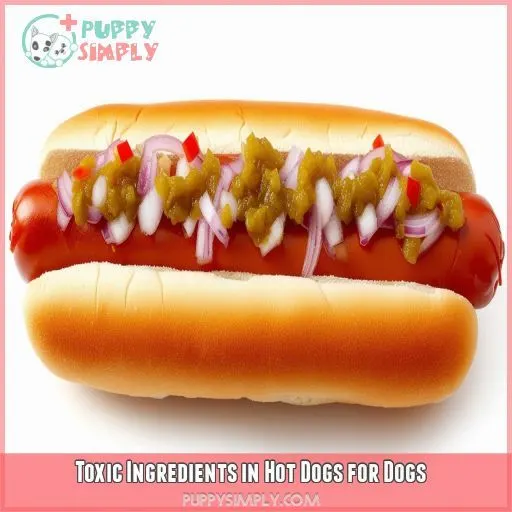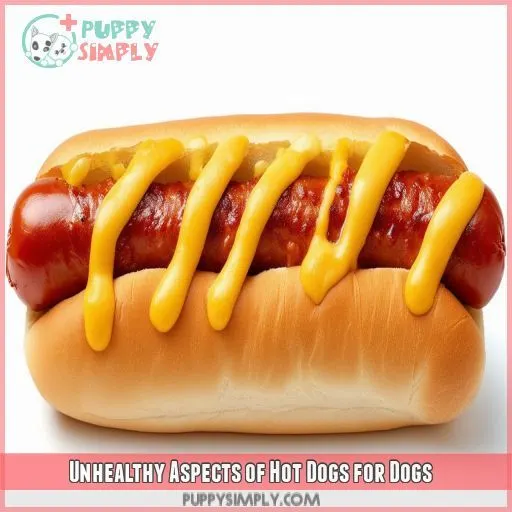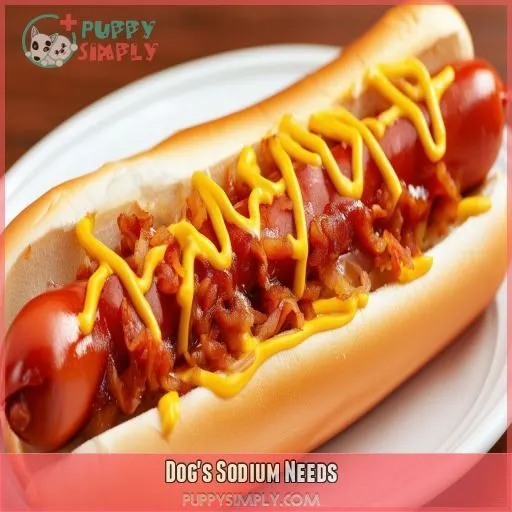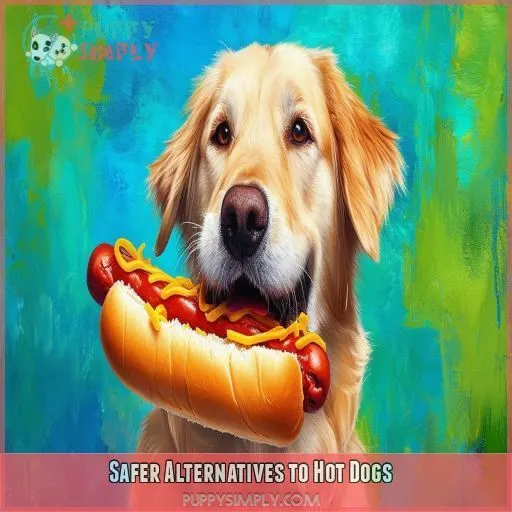This site is supported by our readers. We may earn a commission, at no cost to you, if you purchase through links.
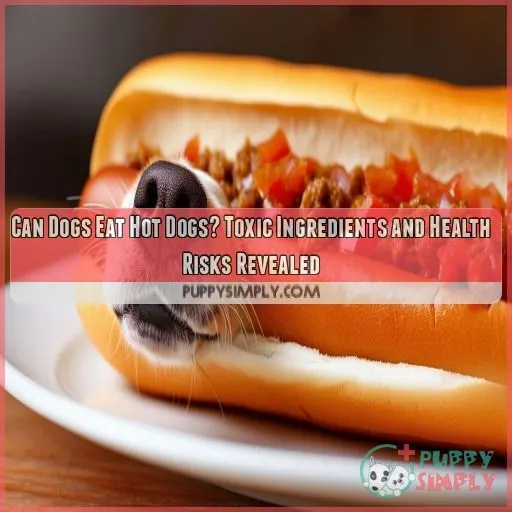
Hot dogs are like the junk food of the canine world—packed with fat, salt, and all sorts of mystery meat that might make your pup’s tummy grumble louder than a drumroll.
Think of them as an occasional treat, not a regular menu item.
A bite here and there during a backyard barbecue won’t hurt, but feeding Fido a frankfurter every day? That’s asking for trouble.
Curious about safer snack options? You’ll want to stick around as we uncover tasty alternatives your dog will love!
Table Of Contents
Key Takeaways
- Hot dogs are a no-no for dogs, packed with ingredients that can make them sick, like sodium nitrite, MSG, and garlic powder.
- They’re like junk food for dogs – high in sodium, low in nutrients, and can lead to health problems like dehydration and high blood pressure.
- Choking is a real risk with hot dogs because of their shape and size, so it’s best to avoid them altogether.
- If you want to give your dog a treat, opt for healthier alternatives like plain, unseasoned meat, homemade treats, or lean meats.
Can Dogs Eat a Hot Dog?
No, dogs shouldn’t eat hot dogs. Hot dogs contain harmful ingredients like sodium nitrate, MSG, and high amounts of salt that can be toxic for dogs.
Toxic Ingredients in Hot Dogs for Dogs
Before giving your dog a bite of your hot dog, it’s important to know that many hot dogs contain ingredients that are toxic to dogs. Some of the most concerning include sodium nitrate, monosodium glutamate (MSG), sugars or artificial sweeteners, and garlic and onion powder.
Sodium Nitrate
Sodium nitrate, a preservative in hot dogs, can be toxic to dogs:
- Increases sodium sensitivity
- Negatively impacts nitrate metabolism
- Raises blood pressure and dehydration risk
Monosodium Glutamate (MSG)
MSG, a flavor enhancer in some hot dogs, may cause adverse reactions in dogs:
- Digestive issues like diarrhea
- Allergic responses
- Potential toxicity, especially with repeated exposure
Sugars or Artificial Sweeteners
Sugars and artificial sweeteners, while appealing to your pup’s taste buds, can lead to:
- Weight gain
- Dental issues
- Diabetes
- Toxicity in high doses
Opt for healthier treats instead.
Garlic and Onion Powder
Garlic and onion powder in hot dogs can be toxic to dogs, causing digestive issues and anemia. Avoid feeding dogs treats with these ingredients. Instead, consider:
- Plain, unseasoned meat
- Homemade dog treats
- Checking ingredient labels
Unhealthy Aspects of Hot Dogs for Dogs
Beyond the toxic ingredients, hot dogs pose other health risks for your pup. They’re high in sodium, which can lead to dehydration and high blood pressure, and their shape makes them a Choking hazard that can also cause digestive issues like bellyaches and diarrhea.
High Sodium Content
Hot dogs are sodium bombs, packing over 500 mg per link – way more than your pup needs daily. Overloading on sodium can lead to:
- Dehydration
- High blood pressure
- Digestive distress
- Sodium toxicity
Choking Hazard
In addition to the high sodium content, hot dogs pose a choking hazard for dogs due to their shape and size. To prevent choking:
- Cut hot dogs into small, bite-sized pieces
- Supervise your dog while eating
- Learn dog first aid and pet emergency preparedness
Choose dog-friendly treats that are safer alternatives to avoid potential choking incidents.
Digestive Issues
Hot dogs can wreak havoc on your pup’s tummy. They’re notorious for causing:
- Canine pancreatitis
- Digestive upset
- Bloating
- Upset stomach
- Stomach distress
Think of a hot dog as a greasy rollercoaster for your dog’s gut—thrilling at first, but ends in queasiness.
Dog’s Sodium Needs
Your dog’s sodium needs are much lower than you might think: a 33-pound dog only requires about 200 mg of sodium per day. With an average hot dog containing over 500 mg of sodium, feeding your dog even half a hot dog exceeds their daily limit, potentially leading to health issues.
Daily Requirement
You’d be surprised how little sodium your furry friend needs. A 33-pound dog only requires about 200 mg daily. Too much can lead to:
- Dehydration blues
- Blood pressure highs
- Tummy troubles
- Excessive thirst
- Potential vet visits
Hot Dog Sodium Content
Now, let’s talk hot dog saltiness. Your average hot dog packs a sodium punch, with over 500 mg per tube steak. That’s a lot for your furry friend! Consider this about hot dog sodium levels:
- Can lead to dehydration
- May cause high blood pressure
- Potential for sodium toxicity
- Risk of sodium poisoning
- Affects kidney function
Exceeding Needs
You might think sharing your hot dog is a treat, but you’re barking up the wrong tree. Half a hot dog exceeds your pup’s daily sodium limit, potentially leading to:
- Dehydration
- High blood pressure
- Kidney issues
Portion control and hydration importance can’t be overstressed—consult your veterinarian.
Safer Alternatives to Hot Dogs
Instead of hot dogs, offer your dog plain, unseasoned meats like beef, pork, or chicken, cut into bite-sized pieces to prevent choking. You can also make homemade treats using lean meats, which are healthier alternatives that don’t pose the same risks as processed hot dogs.
Plain Meat
You’re not a bad dog parent for wanting to share your hot dog. But for your pup’s health, stick with plain beef, pork, or chicken. These offer high protein content and nutritional value without the risks.
- Lean cuts like sirloin or chicken breast
- No salt or seasoning added
- Raw feeding or home cooking options
- Bite-sized pieces for safety
Homemade Treats
While plain meat is a good choice, making homemade treats gives you full control over ingredients. Consider these dog-friendly options:
- Peanut butter and banana bites
- Sweet potato chews
- Pumpkin and oat cookies
Avoiding processed foods and making healthy choices guarantees your furry friend stays tail-waggingly happy.
Lean Meats
Choose lean meats for your dog to support muscle growth, weight management, and calorie control.
- Plain beef
- Skinless chicken breast
- Lean pork
- Turkey
These are excellent lean protein options that double as healthy, homemade treats.
Frequently Asked Questions (FAQs)
Can puppies safely eat hot dogs?
Would you feed a baby junk food? Puppies shouldn’t eat hot dogs due to harmful ingredients like Sodium nitrate and garlic powder. High sodium can cause dehydration and health issues. Stick to plain, unseasoned meats instead. (Source)
How often can I give my dog hot dogs?
You shouldn’t make hot dogs a regular treat for your pup. They’re like junk food—tasty but unhealthy. Stick to once a month, max, and in small portions. Your dog’s waistline (and vet) will thank you.
Are turkey hot dogs better for dogs?
Sure, because nothing says "I love my dog" like swapping one processed meat tube for another. Turkey hot dogs aren’t better—they’re still high in sodium and additives. You’re better off giving your pup plain, lean turkey instead.
Do kosher hot dogs have fewer harmful ingredients?
You’re barking up the right tree! Kosher hot dogs often have fewer harmful ingredients, as they’re made without fillers, byproducts, or artificial additives. But they’re still high in sodium, so don’t let your pup go hog-wild.
Can hot dogs cause long-term health issues in dogs?
Yes, they can. High sodium content in hot dogs may lead to kidney problems, heart disease, and high blood pressure over time. Plus, preservatives like nitrates could increase cancer risks. It’s best to stick with healthier treats for your furry friend.
Conclusion
Hot dogs might be your guilty pleasure, but they’re a danger zone for your furry friend. Can dogs eat a hot dog? The answer is a resounding no.
Packed with toxic ingredients like sodium nitrate, MSG, and garlic powder, hot dogs pose serious health risks. Their high sodium content far exceeds your dog’s daily needs, potentially leading to dehydration or toxicity. They’re also a choking hazard.
Instead, treat your pup to safer options like plain meat or homemade treats. Your dog’s health is in your hands.

